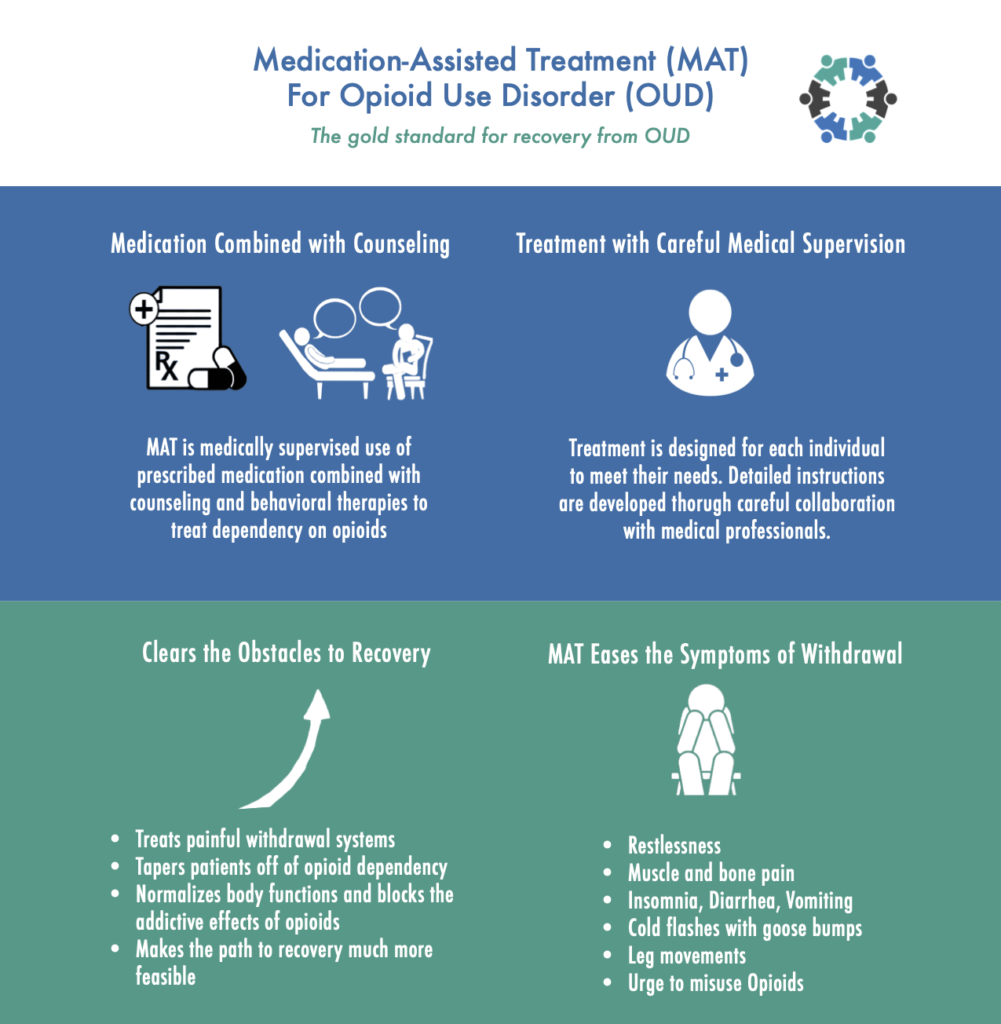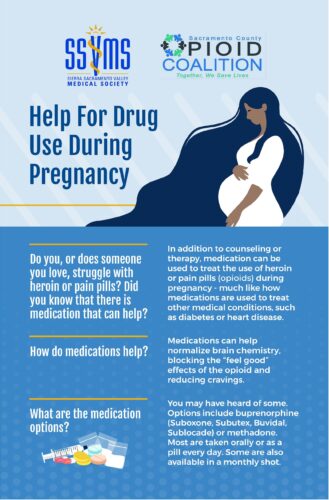Medication Assisted Treatment (MAT)
What is Medication Assisted Treatment (MAT) ?
Defined by the FDA, Medication Assisted Treatment (MAT) is the use of medications in combination with counseling and behavioral therapies, which is effective in the treatment of opioid use disorders (OUD) and can help some people to sustain recovery. It’s known to be a proven way to facilitate recovery and prevent relapse for those who suffer from substance use disorder (SUD) given the holistic nature of treatment. MAT aims to treat OUD by regulating brain chemistry, reducing the effects of opioids, and lessening physical cravings by easing symptoms of withdrawal.
The three medications that are commonly used for MAT include Buprenorphine, Methadone, and extended release Naltrexone. These three medications have been proven to be effective and safe for use in combination with counseling and psychosocial support. Opioid use disorder is considered to be chronic, and each individual’s treatment plan should be assessed periodically to ensure that the treatment plan is working and the patient’s needs are being fully met.
Methadone
A long acting, full opioid agonist that reduces opioid cravings and withdrawal symptoms. It initially must be taken supervised by a practitioner, and the length of methadone treatment is 12 months minimum. When taken as prescribed, it is safe and effective in a part of treating OUD.
Buprenorphine
An opioid partial agonist that can decrease physical dependency and increase safety in cases of overdose. Due to the lower potential of misuse, buprenorphine is very accessible as it can be prescribed and dispensed at a doctor’s office. Patients start using when they are in the earlier stages of opioid withdrawal.
Naltrexone
Blocks the sedative effects of opioids and binds and blocks opioid receptors to reduce and suppress opioid cravings. It can actually be used to treat both opioid and alcohol use disorder.
Naltrexone is not addictive and does not cause withdrawal symptoms with stopping use and comes in pill and injectable form.
Does it Work?
A multitude of studies have proven time and time again that the holistic method of MAT works effectively on people with Opioid Use Disorder. Interested in seeing the research? Check out some peer reviewed studies below.
“This systematic review synthesizes evidence on the effects of medication-assisted treatment for opioid use disorder on functional outcomes, including cognitive, physical, occupational, social/behavioral, and neurological function.”
Free CME Webinars for Your Medical Staff
 The pandemic has dramatically increased the complexity of concerns that patients bring to us and simultaneously increased compassion fatigue among providers.
The pandemic has dramatically increased the complexity of concerns that patients bring to us and simultaneously increased compassion fatigue among providers.
The Sierra Sacramento Valley Medical Society (SSVMS) is providing free CME webinars to medical groups/staffs around how to increase rewarding interactions with patients to reduce burnout, engage patients in behavior change, and enhance their motivation for treatment, specifically medication assisted treatment for substance use disorders.
To schedule one or more webinars for your group, email [email protected].
Webinars Available:
Motivational Interviewing (MI) has more research to support its effectiveness than most medications- and using it increases the chances our interactions will be more rewarding, more connected and less argumentative. MI is applicable to any behavior change, has been studied cross-culturally, and employs some strategies that can actually shorten some visit types. In this practical workshop, you’ll get a brief overview of the most current and compelling research on MI and substance use disorders; learn the 5 most powerful strategies for helping patients struggling with SUD or other behavior changes; and 2 “anti-growth” statements to avoid saying to patients (and our friends and family!) to increase the likelihood of positive care outcomes.
Presented by: Elizabeth Morrison PhD, LCSW – CEO and Principal at EM Consulting

We are in the helping professions to help- yet being human means we, like everyone else, have negative judgments, biases and stigma about particular conditions, characteristics and populations. Excavating our own biases around addiction, drug use during pregnancy, “problem” patients and more can help us be of optimal service to those in our care- and can help us in our personal lives, as well. In this workshop you’ll get a brief overview of the most current and most intriguing research on stigma and its impact on health outcomes; practical strategies for identifying our own biases, and evidenced-based techniques to mitigate bias, judgment and stigma, in order to provide the best care possible.
Presented by: Elizabeth Morrison PhD, LCSW – CEO and Principal at EM Consulting
Buprenorphine Treatment for addiction is now primary care- yet not all of us feel comfortable with the pharmacology. In this workshop, you’ll hear the current best practices for using buprenorphine to treat opioid disorder in pregnant and parenting women. Come and get your questions answered.
Webinar Schedule:
Making a Difference in 10 minutes: Motivational Interviewing for Substance Use Disorders.
In Person Events:
Registration coming soon:
Continual Growth: Self-Reflection as a Tool for Improving Patient Health Outcomes
December 7, 2022
6:30 PM
Survey for X-Waivered Providers
 Providers and patients face barriers to Medication-Assisted Treatments. Stigma still makes accessing treatments difficult for patients with Opioid Use Disorder. We surveyed X-Waivered Providers who are certified to give Medication-Assisted Treatment on the challenges they faced.
Providers and patients face barriers to Medication-Assisted Treatments. Stigma still makes accessing treatments difficult for patients with Opioid Use Disorder. We surveyed X-Waivered Providers who are certified to give Medication-Assisted Treatment on the challenges they faced.
MAT Treatment for Pregnant Women Flyers
We have flyers available for clinics and offices. In order to make sure that these posters get into the hands of patients, we will print and deliver these posters for free. Please contact us at [email protected] to order posters for your lobbies, waiting rooms, and officers!
Download PDF Here
Download Spanish PDF Here
California Health Care Foundation: Addressing Opioid Exposure in Pregnancy — Best Practices for Women and Newborns
Substance Abuse Treatment: Addressing the Specific Needs of Women
MAT Resources
Find prescribers in California on this google Map. Find prescribers at SAMHSA Buprenorphine Practitioner Locator
MAT Handout, SCOC
Medication Assisted Treatment, Partnership for Drug Free Kids
Buprenorphine and the Opioid Crisis 2018, Congressional Research Service
Medications for Addiction Treatment, Shatterproof
How Do Medications Treat Opioid Use Disorder? Department of Human and Health Services
Sacramento Urban Health Institute 2019 Fact Sheet
Myths About MAT, The National Council
MAT Pocket Guide, SAMHSA
California MAT Expansion Project, Department of Health Care Services
Attitudes and Barriers Toward Buprenorphine Prescriptions in El Dorado and Sacramento County
Instructional Videos










Teach Your Patients About MAT, 38 seconds
Give Information: Ask, Ask, Tell, Ask Method, 48 seconds
Questions? Please email [email protected]



